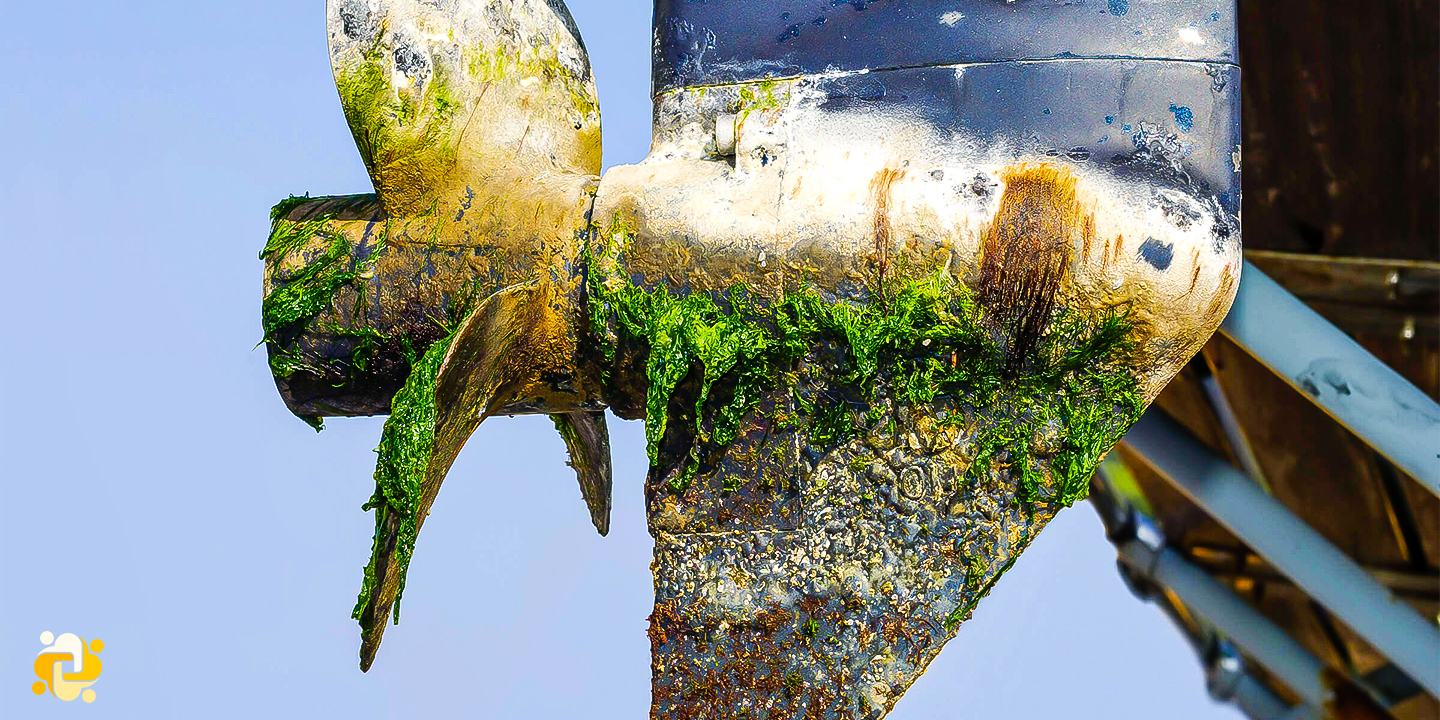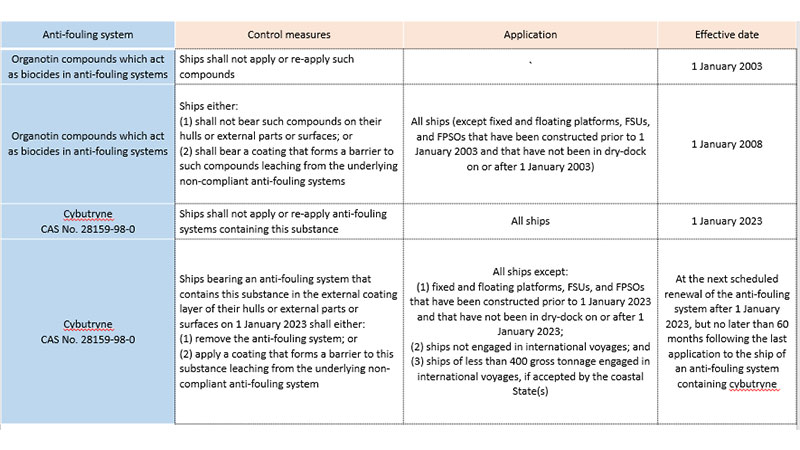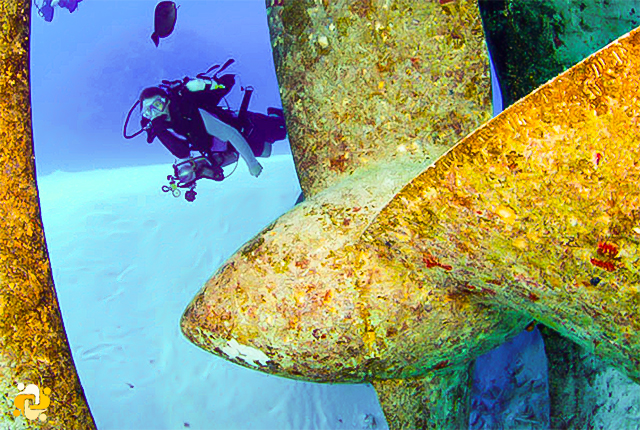
Ban on Use of Anti-Fouling Systems Containing Cybutryne
Background
Anti-fouling paints are used to coat the bottoms of ships to prevent sea life such as algae and mollusks attaching themselves to the hull – thereby slowing down the ship and increasing fuel consumption.
The new Convention defines “anti-fouling systems” as “a coating, paint, surface treatment, surface or device that is used on a ship to control or prevent attachment of unwanted organisms”.
In the early days of sailing ships, lime and later arsenic were used to coat ships' hulls, until the modern chemicals industry developed effective anti-fouling paints using metallic compounds.
These compounds slowly "leach" into the sea water, killing barnacles and other marine life that have attached to the ship. But the studies have shown that these compounds persist in the water, killing sea life, harming the environment and possibly entering the food chain.
One of the most effective anti-fouling paints, developed in the 1960s, contains the organotin tributylin (TBT), which has been proven to cause deformations in oysters and sex changes in whelks.
The adoption of the new Convention marked the successful outcome of the task set by Chapter 17 of Agenda 21 developed by the 1992 Rio Conference on Environment and Development. Chapter 17 called on States to take measures to reduce pollution caused by organotin compounds used in anti-fouling systems.
Agenda 21 sets out a plan of action to guarantee that life in the next millennium will change substantially for the better. It was endorsed by the world's governments at the UN Conference on Environment and Development, in Rio de Janeiro, on June 1992.
The harmful environmental effects of organotin compounds were recognized by IMO in 1989. In 1990 IMO’s Marine Environment Protection Committee (MEPC) adopted a resolution which recommended that Governments adopt measures to eliminate the use of anti-fouling paint containing TBT on non-aluminum hulled vessels of less than 25 meters in length and eliminate the use of anti-fouling paints with a leaching rate of more than four micrograms of TBT per day.
In November 1999, IMO adopted an Assembly resolution that called on the MEPC to develop an instrument, legally binding throughout the world, to address the harmful effects of anti-fouling systems used on ships. The resolution called for a global prohibition on the application of organotin compounds which act as biocides in anti-fouling systems on ships by 1 January 2003, and a complete prohibition by 1 January 2008.
This instrument was later adopted as the International Convention on the Control of Harmful Anti-Fouling Systems on Ships.
The International Convention on the Control of Harmful Anti-Fouling Systems on Ships, which was adopted on 5 October 2001, will prohibit the use of harmful organotin compounds in anti-fouling paints used on ships and will establish a mechanism to prevent the potential future use of other harmful substances in anti-fouling systems. The Convention entered into force on 17 September 2008.
Under the terms of the Convention, Parties to the Convention are required to prohibit and/or restrict the use of harmful anti-fouling systems on ships flying their flag, as well as ships not entitled to fly their flag but which operate under their authority and all ships that enter a port, shipyard or offshore terminal of a Party.
Annex 1 attached to the Convention states that by an effective date of 1 January 2003, all ships shall not apply or re-apply organotin compounds which act as biocides in anti-fouling systems, and by 1 January 2008 (effective date), ships either:
- shall not bear such compounds on their hulls or external parts or surfaces; or
- shall bear a coating that forms a barrier to such compounds leaching from the underlying non-compliant anti-fouling systems.
This applies to all ships (except fixed and floating platforms, floating storage units (FSUs), and floating production storage and off-loading units (FPSOs) that have been constructed prior to 1 January 2003 and that have not been in dry-dock on or after 1 January 2003).
Ships of above 400 gross tonnages and above engaged in international voyages (excluding fixed or floating platforms, FSUs and FPSOs) will be required to undergo an initial survey before the ship is put into service or before the International Anti-Fouling System Certificate is issued for the first time; and a survey when the anti-fouling systems are changed or replaced.
Ships of 24 meters or more in length but less than 400 gross tonnage engaged in international voyages (excluding fixed or floating platforms, FSUs and FPSOs) will have to carry a Declaration on Anti-Fouling Systems signed by the owner or authorized agent. The Declaration will have to be accompanied by appropriate documentation such as a paint receipt or contractor invoice.
At its seventy-first session in July 2017, MEPC approved a new output to amend Annex 1 to the AFS Convention to include controls on cybutryne. While work on this matter is ongoing in the Sub-Committee on Pollution Prevention and Response (PPR), the scientific data presented so far indicates that cybutryne causes significant adverse effects to the environment, especially to aquatic ecosystems.

New AFS Convention’s amendment
IMO adopted amendments to the AFS Convention vide Resolution MEPC 331 (76) to include controls on Cybutryne and an operative paragraph with respect to issuance of the new International Anti-Fouling System Certificate. The amendments will enter into force on 1 January 2023. The amendment prohibits application or re-application of anti-fouling systems containing Cybutryne or Irgarol (CAS No. 28159-98-0) on all ships from 1 January 2023.

CONTROLS ON ANTI-FOULING SYSTEMS
Ship owners/ managers and masters are advised to take note of above requirements and accordingly ensure that necessary planning is done while procuring anti-fouling paints so that it does not contain Cybutryne. In case of ships where anti-fouling system already contains Cybutryne (CAS No. 28159-98-0) as on 1 January 2023, planning will be required for either the removal of such anti-fouling paint or for application of a sealing coating in consultation with the paint manufacturer in order to comply with the amended requirements.








